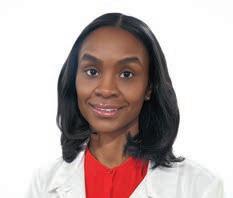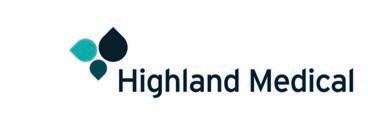






Dear Readers,
As we enjoy warmer days and more daylight—whether listening to a band in a local park or watching a New York Boulders baseball game—now is the perfect time to get outside, take in the fresh air and welcome a new season of sunshine and street festivals.
Enclosed in this issue is a special supplement focused on women’s health. Research has found that 89% of women in the U.S. would like to be more proactive about their health, yet instead they often prioritize the health of others over their own. Career demands, caring for children and looking after elderly parents lead women to neglect their self-care. Our educational insert provides practical women’s health advice and a schedule of recommended age-based screenings for optimal well-being.
For men’s health, we have developed a digital “maintenance manual for men” at montefiorenyack.org/mens-health. Even when not feeling well, men are often reluctant to see a doctor, opting instead to “tough it out.” Our head-to-toe manual offers reasons why men should not delay self-care, as conditions such as heart disease are preventable, and if present, are treatable.
Montefiore Nyack Hospital’s commitment to expanding services includes our new lung cancer screening program. Patients diagnosed with a lung nodule or lung cancer can now receive care provided by thoracic surgeons from White Plains Hospital Physicians Associates, experts in lung disease treatment and trained in advanced robotic thoracic surgery.
Lastly, our Facilities team is in the process of converting every semiprivate patient room into a private suite with upgraded amenities. This project has long been a vision of mine. We expect close to 90% completion by year-end. Singlepatient rooms will transform how we deliver care and significantly enhance our patients’ experience.
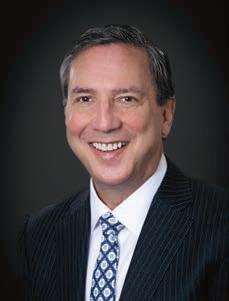
I cannot overstate the adage: When you have your health, you have wealth! At Montefiore Nyack Hospital, we are always here to help you protect and maintain your most valuable asset.

Mark E. Geller, MD, FACR President & CEO
Montefiore Nyack Hospital
Montefiore Nyack Hospital has been recognized as one of America’s Top 100 Hospitals for Coronary Intervention in 2025 by Healthgrades, a leading online source for comprehensive information about physicians and hospitals.
To unsubscribe, please email us at publicrelations@montefiorenyack.org.
facebook.com/MontefioreNyack
@MontefioreNyack
@MontefioreNyack
@Montefiore_Nyack
linkedin.com/MontefioreNyackHospital


Each year, Healthgrades evaluates the performance of 4,500 hospitals using quality measures and identifies those with outstanding clinical outcomes in coronary intervention procedures, including angioplasty with stent placement. These quality measures include assessments of clinical outcomes, patient safety and patient experiences in coronary interventional procedures, heart attacks, heart failure and coronary artery bypass graft or valve surgeries.
Montefiore Nyack Hospital also received a 2025 Patient Safety Excellence Award.™ This distinction places the organization in the top 10% of hospitals nationwide for patient safety.


The annual study found that patients treated in hospitals awarded the 2025 Patient Safety Excellence Award experience a significantly lower chance of encountering one of the four leading safety indicators compared with those treated at non-recipient hospitals. These safety indicators are in-hospital falls resulting in fractures, collapsed lung due to a procedure or surgery, pressure sores or bed sores and catheter-related bloodstream infections.
Montefiore Nyack Hospital’s achievements are grounded solely in what matters most: patient outcomes.
EDITORIAL
Lauren Malone, AVP, PR and Marketing
Rose Croke, Director of Communications
Briana Tolve, Marketing Manager
Jasmine Gonzalez, Marketing Coordinator


6
4
FATTY LIVER DISEASE: WHAT TO BE AWARE OF
Early detection is key to treat this silent disease.
6
ENHANCING GUT HEALTH
Understand the gut microbiome for better wellbeing and happiness.


8
NEUROSURGERY
Cutting-edge technology and minimally invasive techniques provide you with advanced care.
10
TREATING LUNG CANCER
Early screening is the best preventive measure.

Did you know that 1 in 8 adults in Rockland County were smokers in 2023? If you are one of them—or if you quit within the last 15 years—there is a simple screening test you should know about.
The Facts You Need to Know:
• This screening can reduce lung cancer death rates by 20%.
• It takes less than 10 minutes.
• It is completely painless.
• Most insurance plans and Medicare cover it.
SUMMER SAFETY TIPS
Taking precautions: the best way to keep you and your family safe and healthy.
14 WHAT TO EXPECT AT PRENATAL VISITS
Breaking down hospital visits during each stage of pregnancy.
“If lung cancer is detected early, when it is small and before it spreads, it is more likely to be treated successfully. That’s why screening for lung cancer in current and former smokers is so important,” says Dr. Rostislav Gorbatov, a pulmonary and critical care physician at Highland Medical, Pulmonary Medicine Associates in Nyack, New York.
Call 845-348-8360 to schedule a screening appointment at Highland Medical, Pulmonary Medicine Associates.
ROUTINE BLOOD WORK MAY UNCOVER THIS SILENT BUT PREVENTABLE DISEASE.

One out of every four people in the United States has fatty liver disease, a condition in which excess fat builds up in the liver and causes the liver cells to swell and become damaged. Most people don’t know they have fatty liver disease.
“Fatty liver disease can be present for many years before symptoms, such as fatigue, abdominal pain, jaundice (yellowing of the skin and eyes), itching and swelling, can develop,” says Svetlana Korenfeld, MD, Highland Medical, Rockland Gastroenterology and Liver Disease in West Nyack, NY. “As more liver damage occurs, the disease progresses.”
Fatty liver is usually first discovered during a routine blood test or screening for another medical condition. Elevated liver enzymes may show up in a blood test, or an ultrasound may show an enlarged liver. Before the diagnosis can be made, other conditions, such as viruses, autoimmune conditions and some genetic conditions, must be excluded. Your doctor will need to check if any of the medications you are taking can be contributing.
still inconclusive, a liver biopsy may need to be performed.
The first line of treatment for fatty liver is weight loss, which is usually done through exercise and healthy eating. It is recommended to reduce 7 to 10% of body weight over one year to reduce fat in the liver and decrease inflammation. Rapid weight loss through fasting can make liver inflammation worse. It’s best to eat a diet rich in fruits, vegetables and whole grains and limit the intake of animal products. Limiting sugar and salt intake as well as avoiding alcohol can also help. Moderate to intense exercise for 30 minutes a day is recommended. Another vital part of treatment is managing diabetes and high cholesterol.
If left untreated, fatty liver can lead to serious complications, such as liver fibrosis and cirrhosis. Fatty liver causes inflammation, which leads to scarring called fibrosis. When scar tissue takes over most of the liver, it leads to cirrhosis, which cannot be reversed. If cirrhosis is not treated, it can cause the liver to not work properly or not work at all. Patients with liver failure may eventually need a liver transplant.
people are between the ages of 40 and 60, although younger people can be affected. The condition is more common in women, especially after menopause.
Fatty liver disease can be prevented by maintaining a healthy weight through exercising regularly and eating a healthy diet. A diet rich in fruits, vegetables and healthy fats found in fish, nuts and fruits is a good start. Avoiding foods high in fructose (soda, sports drinks), processed carbohydrates (white bread, rice, pasta) and fatty foods (red meat, deli meats, fullfat dairy) is helpful as well. Being physically active (walking, jogging, swimming, cycling) can also help prevent fatty liver. It is also important to manage stress, get 7 to 8 hours of sleep a night and limit alcohol intake.
“Before scarring occurs in the liver from inflammation, fatty liver can be completely reversed,” says Dr. Korenfeld. “Even when scarring occurs, healthy lifestyle choices can slow or even stop progression.”

This condition, nonalcoholic fatty liver disease (NAFLD) or metabolic-associated steatotic liver disease (MASLD), can get worse and cause liver inflammation. When inflammation is present, it is called nonalcoholic steatohepatitis (NASH) or metabolic dysfunctionassociated steatohepatitis (MASH). Newer imaging techniques can be used to determine the degree of liver damage. These include ultrasound or MRI elastography, which measure the stiffness of the liver. If the diagnosis is
For people with more advanced liver disease due to MASH, a medication called resmetirom (Rezdiffra) was recently approved for stage 2 or 3 fibrosis by the Food and Drug Administration.
Fatty liver tends to develop in people who are overweight or obese, or have diabetes, high cholesterol, high triglycerides, obstructive sleep apnea or high blood pressure. Most affected
Patients diagnosed with fatty liver should follow up with their doctor to check liver enzymes every six to 12 months. Patients who are overweight, have high cholesterol or have diabetes should follow closely with their doctors to manage these conditions.
Scientists don’t know why some people with fatty liver develop inflammation and scarring and some don’t. Genetics, ethnicity, sex and other medical conditions might play a role. This disease usually takes a long time to progress; therefore, there is ample time to prevent or reverse it by following healthy lifestyle choices.
Highland Medical, Rockland Gastroenterology and Liver Disease, is located at 2 Medical Park Drive, Suite 14, West Nyack, NY. Call 845-362-3300 to schedule an appointment with a board-certified gastroenterologist.

KEEPING YOUR GUT MICROBIOME HEALTHY HELPS YOU STAY HAPPY.
Lorraine Olivero-Brodeur, DNP, FNP-BC, a board-certified family nurse practitioner at Highland Medical, Palisades Primary Care and Pulmonary Medicine in West Nyack, NY, explains the importance of the gut microbiome and its effects on overall health.
Approximately 70% of the immune system resides in the gut. Recent research has highlighted the significant impact of gut health on digestion, metabolism, immune function and even mental health.
A healthy microbiome helps modulate immune responses, protects the body from pathogens and prevents overreactions that can lead to allergies and autoimmune diseases. An unhealthy gut microbiome is often caused by factors like poor diet (high in sugar and processed foods), stress, lack of sleep or the overuse of antibiotics.
The gut microbiome is a complex community of trillions of microorganisms residing in our intestines, consisting of bacteria, viruses, fungi and other microbes that work harmoniously to perform various functions vital to our well-being. One of this intricate ecosystem’s primary functions is aiding in the digestion of food. The microbes help break down complex carbohydrates, proteins and fats, which the human body cannot digest. This breakdown process facilitates the absorption of essential nutrients and produces short-chain fatty acids (SCFAs) that provide energy to gut cells and contribute to various bodily functions. A balanced microbiome can thus prevent digestive issues such as bloating, constipation and irritable bowel syndrome (IBS).
Moreover, the gut-brain connection is another fascinating aspect of the microbiome’s role in health. The gut produces neurotransmitters such as serotonin, which significantly influences mood and cognitive function. An imbalance in gut bacteria has been linked to mental health disorders such as anxiety and depression. Consequently, optimizing gut health can also contribute to improved mental well-being.
A gut-friendly diet focuses on foods that promote the growth of beneficial bacteria while reducing inflammation and supporting detoxification and overall digestive health.

• Diverse Diet: Aim to include a rainbow of colors on your plate to ensure a wide range of nutrients. Consume a varied
diet rich in fruits, vegetables, whole grains, lean proteins, fiber and nutrients that feed various strains of bacteria, fostering a balanced ecosystem.
• Probiotics and Fermented Foods: Incorporate probiotics through supplements or fermented foods such as yogurt, kefir, sauerkraut and kimchi to introduce beneficial bacteria into the gut. These foods add to the microbial diversity and help restore balance, especially after antibiotic use.
• Prebiotics: Unlike probiotics, prebiotics are non-digestible fibers that feed the good bacteria already present in the gut. Foods high in prebiotics include garlic, onions, bananas and asparagus. Regularly eating these foods can support the growth of beneficial bacteria.
• Limit Processed Foods: Reduce your intake of highly processed foods containing artificial additives, sugars and unhealthy fats that can negatively impact gut health.
Nearly 90% of chronic disease begins in your gut, and 70 to 80% of your immune system lives in your gut. Chronic stress can disrupt the balance of gut bacteria.
Engaging in stress-reduction techniques such as mindfulness, yoga or regular exercise can positively impact gut health. Incorporating regular physical activity into your routine can enhance overall gut health and contribute to a wellfunctioning microbiome.
Adequate hydration is essential for digestion and the overall functioning of the gut. Drinking plenty of water can help maintain the mucosal lining of the intestines and promote the growth of beneficial bacteria.
It’s important to support gut health by eating a balanced diet rich in fiber, fermented foods and prebiotics, managing stress and staying physically active. Being mindful of our gut microbiome’s impact on everything from digestion and immunity to mental well-being will help you make wiser health choices support your gut health.
To schedule a consultation at Highland Medical, Palisades Primary Care and Pulmonary Medicine, call 845-727-7733.

THE SPECIALISTS IN MONTEFIORE NYACK HOSPITAL’S NEUROSURGERY PROGRAM LEVERAGE CUTTING-EDGE TECHNOLOGY AND MINIMALLY INVASIVE TECHNIQUES TO DELIVER ADVANCED NEUROLOGICAL CARE— EVEN CLOSER TO HOME FOR PATIENTS IN ROCKLAND COUNTY.
Neurological conditions are a leading cause of illness and disability globally, affecting more than one in three people, according to a 2021 study in The Lancet Neurology. For patients with Alzheimer’s disease, migraine, stroke, traumatic brain injury, spinal cord disorders or other neurological concerns, comprehensive treatment is now available through the Neurosurgery Program at Montefiore Nyack Hospital. This program comprises a
multi-disciplinary team of specialists who collaborate to provide both surgical and nonsurgical therapies to help patients find relief.
The Neurosurgery Program at Montefiore Nyack Hospital is a cross-collaboration between White Plains Hospital (WPH) and Montefiore Einstein. It is led by Dr. Virany Hillard, who serves as director of minimally invasive neurosurgery at White Plains Hospital, and Dr. Yaroslav Gelfand, who is the director of minimally
invasive and endoscopic spine surgery at Montefiore Einstein.
COLLABORATION FOR EXCELLENCE
“Our team, which includes highly trained physicians and specialists, works together to address a range of neurological concerns,” shares Dr. Hillard, who specializes in the treatment of cervical spine conditions and injuries as well as disc herniation and replacement.
“Collaborating with our network of physicians at Montefiore Nyack and

If you are experiencing symptoms affecting your brain, spine or nervous system, speak with your primary care physician, pain management specialist or neurologist to request a referral for a neurosurgeon.
To schedule a consultation with one of our boardcertified neurosurgeons at 2 Crosfield Avenue, Suite 202, in West Nyack, please call 914-849-7593. throughout the Hudson Valley, we are able to ensure that every patient receives comprehensive care.” Many patients are referred to the program by their primary care physician, ENT physician, neurologist or pain management specialist when treatments such as medication, physical therapy or interventional pain management are not effective in alleviating their symptoms. While a number of advanced procedures are available, the team always explores nonoperative treatment options prior to surgery. For those requiring surgery, whether it is spinal fusion surgery, a minimally invasive endovascular procedure or open cranial neurosurgery, the goal is to alleviate symptoms, improve function and
improve the quality of life for patients, shares Dr. Kaushik Das, director of neurosurgery at White Plains Hospital. Dr. Das, a spine surgery specialist in the program, frequently treats conditions such as lumbar stenosis, cervical and lumbar disc herniations and spinal tumors.
In addition to surgeries performed on a planned basis, the team also performs emergency surgeries to address life-threatening conditions, such as a stroke or ruptured brain aneurysm. “Many conditions can now be treated using endovascular techniques rather than open neurosurgery,” explains Dr. Jared Cooper, a White Plains Hospital neurosurgeon in the program who specializes in cranial and cerebrovascular neurosurgery, including neuro-endovascular surgery. “In these procedures, the surgeon inserts a small catheter into the femoral or radial artery to treat vascular conditions of the brain and spine. Minimally invasive surgical techniques often result in faster recovery times for patients, so they can get back to the activities they enjoy sooner.”
While some patients may be discharged home following surgical procedures, others may require short-term hospitalization, followed by rehabilitation for optimal recovery. “Access to high-quality neuro-rehabilitation services is essential for many of our patients,” explains Dr. Hillard. With the renowned Burke Rehabilitation Hospital, also a member of the Montefiore Health System, conveniently located in White Plains, the program can seamlessly coordinate these services for patients who need them on an inpatient basis. In addition, Burke also offers outpatient rehabilitation services at its location in West Nyack.
• Cerebrovascular disease: Conditions impacting blood flow to the brain, including cerebral aneurysms, arteriovenous malformations, carotid artery stenosis, ischemic and hemorrhagic stroke, and subdural hematomas.
• Cervical spondylotic myelopathy: Bone or soft tissue structures push on the spinal cord. Almost all people will develop stenosis or compression of the spinal cord with age due to herniated discs, bone spurs or overgrown ligaments. Only a minority develop symptoms of myelopathy.
• Herniated discs: Cervical and lumbar disc herniations, also known as slipped discs, are common in both the cervical (neck) and lumbar (lower back) regions of the spine, causing pain and other symptoms that can radiate down the limbs.
• Lumbar stenosis: A condition in which the spinal canal in the lower back, also called the lumbar region, narrows and puts pressure on the nerves and spinal cord.
• Spinal tumors: Abnormal growths that develop in or around the spinal cord that may or may not be cancerous.
EARLY DETECTION IS KEY FOR LUNG CANCER TREATMENT TO BE SUCCESSFUL.

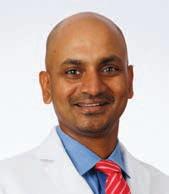
Lung cancer is one of the most common forms of cancer in Rockland County, New York. The American Cancer Society recommends lung cancer screening with low-dose chest CT scans for patients over 50 years old who have smoked a pack a day for more than 20 years, regardless of when they quit.
Montefiore Nyack Hospital offers a screening program to detect and treat lung cancer early, when it is most treatable. Led by Murali G. Krishna, MD, FCCP, director of pulmonology at Montefiore Nyack Hospital, along with Dr. Cynthia Chin, Dr. Sean Kwon and Dr. Todd Weiser, thoracic surgeons who perform surgery at Montefiore Nyack Hospital and White Plains Hospital, this program provides patients access to screenings with a referral from their primary care physician.
A lung cancer screening typically involves a low-dose CT scan to detect early signs of lung cancer. If the screening identifies a nodule or abnormality in the lung, your physician may recommend further diagnostic tests. These tests include additional imaging studies, a biopsy or a PET/CT scan to gather more information about the suspicious lesion. If it’s malignant, the gold standard for treating early-stage lung cancer is thoracic surgery.

“Screening, specifically for former smokers over 50 years of age, before the development of symptoms, is important, as lung cancer is usually too advanced for curative treatment once symptoms develop,” says Dr. Krishna. “Being part of the Montefiore Health System, we have access to clinical expertise across various specialties, and this is an example of how we work with colleagues at White Plains Hospital to offer advanced
FIRST YEAR AFTER THREE YEARS
Every 3 to 6 months with CT scans and physical exams
SECOND AND THIRD YEAR
Every 6 months with imaging tests and physical exams
Every 6 to 12 months with CT scans and physical exams
robotic thoracic surgeries to patients at Montefiore Nyack Hospital.”
Robotic thoracic surgeries can treat early-stage lung cancer, emphysema and other lung diseases. The surgery can vary in length depending on its complexity, but it typically lasts several hours.
“Robotic-assisted surgery offers several advantages over traditional open surgery, including smaller incisions, less pain, enhanced precision, reduced risk of complications and faster recovery time,” says Dr. Kwon.
Before surgery, you will undergo
a thorough evaluation, including a physical exam, blood tests, imaging (like a CT scan or X-ray) and a pulmonary function test. Be sure to tell your doctor about any medications you are taking, including over-the-counter drugs, as well as herbal supplements and any allergies.
Most patients can go home within 2 to 3 days after surgery, though recovery can take several weeks or months, depending on the procedure and individual health.
Like any surgery, robotic thoracic surgery does come with risks and complications. The incidence is low, and the benefit of quicker recovery times and fewer complications than traditional open surgery makes it a preferred choice for many patients.
“Post-surgery evaluation and monitoring are crucial to ensure that the cancer hasn’t spread or returned,” says Dr. Kwon. “Followup care will usually involve a combination of routine evaluations, imaging tests and potential biopsies. We will develop a follow-up plan that will depend on factors such as lung cancer stage, type of surgery and the patient’s overall health.”
Thoracic surgery can be lifesaving or life-enhancing, but it requires careful preparation and recovery. For some individuals, pulmonary rehabilitation and physical therapy can be beneficial in aiding recovery and improving lung function.
Clear communication with your health care team, adherence to post-operative instructions and patience during recovery are key factors in a successful outcome.
Highland Medical, Pulmonary Medicine Associates, 160 North Midland Avenue, 2nd Floor, within Montefiore Nyack Hospital, specializes in pulmonary conditions and lung disorders.
To schedule a consultation or an appointment, call 845-896-8371. For a lung screening, please call our nurse navigator at 845-348-8360.

PREPARING FOR ALL ELEMENTS OF SUMMER IS THE BEST WAY TO HAVE A SAFE AND FUN SEASON.
As summer begins, more people spend time outside, travel for vacation and get together with family and friends. While the season is associated with fun and relaxation, summertime adventures may increase the risk of injury.
“The best safety measures prevent accidents before they happen,” says Jamil F. Rizqalla, DO, FACEP, FAWM, director of emergency medicine at Montefiore Nyack Hospital. “From
being aware of the risks of sunburn and the importance of wearing appropriate clothing to understanding the difference between heat exhaustion and heatstroke, knowing how to stay safe from exposure to the elements is vital for all ages.”
Heat and humidity can be dangerous, especially for older adults, young children and those with chronic medical conditions such as heart or lung issues. Outdoor activities can lead to
When exposed to the outdoor elements, avoid alcohol consumption and other intoxicants. “There is a higher association of animal bites, drownings, falls and sports injuries when people consume alcohol.”
Jamil F. Rizqalla, DO, FACEP, FAWM Director of Emergency Medicine at Montefiore Nyack Hospital
dehydration, so it’s important to keep hydrated by drinking water or beverages with electrolytes. Stay in the shade if possible, and limit exposure to direct sunlight during the peak hours of 10 a.m. to 4 p.m. Heat exhaustion is caused by excessive heat and dehydration. Symptoms include fatigue, dizziness, nausea and muscle cramps. If left untreated, it can progress to heatstroke, which is a life-threatening condition in which the body’s temperature rises above 104°F (40°C), causing confusion, unconsciousness or even organ failure. Heatstroke requires immediate medical attention.
The National Weather Service issues Red Flag Warnings and Fire Weather Watches to alert of critical weather conditions. Wildfires from dry brush or pollution may cause poor air quality. Stay informed about air quality at AirNow.gov, and limit outdoor activities if necessary.
Thunderstorms may produce large hail, gusty winds and torrential downpours. Before leaving for any water or outdoor activity, check the weather forecast. If thunderstorms are forecast in your area, plan your trip for another day.
When you hear thunder, you are already within range of where the next ground flash may occur, as lightning can strike as far as 10 miles away from the center of a storm. Protect yourself by finding a safe enclosed shelter, such as a car. Do not shelter under or near trees or other structures that may be struck by lightning. If you are on an elevated area, move to lower ground.
The best safety measures prevent accidents before they happen. When exposed to the outdoor elements, avoid alcohol consumption and other intoxicants.
Use a broad-spectrum sunscreen rated at least SPF 30 and reapply every 2 hours after swimming or sweating.
At beaches, pools and lakes, designate a parent or responsible adult who can swim to watch children at all times.
Avoid pool drains and pipes to avoid entrapments.
Be aware of water conditions and avoid swimming in riptides and other dangerous conditions. Never swim alone and don’t dive into unknown bodies of water.
Create a Pool Safety toolkit that includes a first-aid kit, scissors and flotation device and always have a phone at hand.
Know the basics of CPR, as it saves lives.
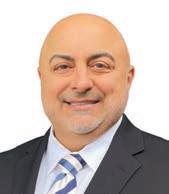
If you are grilling or camping, it’s important to practice fire safety by having a fire extinguisher or water nearby to douse an accidental fire, and always fully extinguish campfires and grills, especially in dry conditions. Check local regulations, and avoid lighting fires during times of high wildfire risk.
“There is a higher association of animal bites, drownings, falls and sports injuries when people consume alcohol,” says Dr. Rizqalla. From broken bones to breathing difficulties and traumatic injuries, our emergency department is here to respond quickly to health emergencies for adults and children. Immediate medical attention is necessary, especially
for heatstroke, severe allergic reactions, drowning incidents or fractures. Taking precautions like wearing protective gear, staying hydrated, limiting alcohol use and practicing safety can help reduce the risk of injury.
Being prepared, having a safety plan and limiting distractions will help ensure a safe and fun summer.
The F.J. Borelli Family Emergency Center at Montefiore Nyack Hospital is a designated area Trauma Center. Local residents have access to advanced, lifesaving trauma expertise as well as a dedicated pediatric unit. For more information, visit montefiorenyack.org/emergency-center.
Women who suspect they may be pregnant should schedule a visit with their health care provider to begin prenatal care. These medical checkups help keep the mother and baby healthy during pregnancy by addressing many issues, such as healthy eating and physical activity, screening tests you might need and what to expect during labor and delivery.
The first prenatal visit to a health care provider usually includes a physical exam, weight check and providing a urine sample. Depending on the stage of the pregnancy, health care providers may also do blood tests and imaging tests, such as ultrasound exams. These visits also include discussions about the mother’s health, the fetus’s health and any questions about the pregnancy.
“Receiving regular prenatal care can reduce the risks of complications during pregnancy and birth and provides for more favorable outcomes,” says Hernan Parra Freitas, MD, an obstetrician and gynecologist with Highland Medical, OBS-GYN of Rockland in New City and Stony Point, NY.

“With so many risks associated with pregnancy,
regular prenatal care is essential in monitoring existing conditions and diagnosing new health issues early so they may be treated effectively.”
Expectant mothers typically see a physician, nurse practitioner or midwife every four weeks up until 28 weeks’ gestation. Visits are recommended every two weeks from 28 weeks’ to 36 weeks’ gestation. At 36 weeks’ gestation until birth, weekly visits are required.
“Each trimester, critical tests are needed to ensure mom and baby are healthy during the pregnancy and even more if the pregnancy is classified as high risk,” says Dr. Parra Freitas. “Pregnancy brings about many changes, physically, hormonally and mentally for moms; regular visits with your doctor are helpful to address any symptoms you are curious about or ask any questions you have.”
Depending on your provider, the following is a brief schedule of what you can expect during prenatal visits throughout pregnancy.
• Blood tests: Evaluate the mother’s health and identify risks or necessary treatments during pregnancy
• Genetic bloodwork
• Urinalysis test: for atypical findings, bacteria or protein
• Ultrasound: Confirms due date, fetal heartbeat and measurements of the baby

• Glucose testing: checks for gestational diabetes. More than one test may be needed if your results of the first are not in range.
• Maternal serum alphafetoprotein blood test: checks for neural tube defects
• Anatomy Ultrasound: in-depth measurements of the baby to determine growth
• Tdap vaccine: protection from tetanus, diphtheria and whooping cough is passed from mother to baby
• RhoGAM injection: for Rh-negative patients only
• 32-week blood work: CBC, RPR and HIV
• 9-month vaginal swabs: Group B strep, gonorrhea and chlamydia
• Ultrasound around 36 weeks
Prenatal care can help prevent complications and inform women about important steps they can take to protect their infant and ensure a healthy pregnancy. New York State is the first state in the US to offer paid time off for prenatal care or medical care related to pregnancy. As part of the New York State Paid Family Leave Program, a privately employed pregnant person can receive 20 hours of paid sick leave for prenatal care.

To schedule a prenatal visit at Highland Medical, OBS-GYN of Rockland, call 845-634-8400 in New City or 845-947-2225 in Stony Point.
To learn about services offered at The Prenatal Center at Montefiore Nyack Hospital, call 845-348-2550 or visit montefiorenyack.org/maternitycenter


